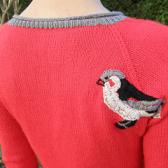The table is set, the batter is mixed, the griddle is hot, and the butter and syrup are ready. This means you are prepared for National Pancake Day. This food holiday is observed each year on September 26.
You may not have time to make a pancake breakfast, but that is okay, pancakes make a great dinner as well. Pancakes can be served at any time and with a variety of toppings or fillings from sweet jams and syrups to savory meats and sauces.
There is archaeological evidence suggesting pancakes are probably the earliest and most widespread breakfast food eaten in prehistoric societies.
Pancakes are also known as flapjacks or hotcakes.
Word of the Day
| |||
| Definition: | (adjective) Growing or remaining under water. | ||
| Synonyms: | subaquatic, submerged, submersed, underwater | ||
| Usage: | The children were excited at the prospect of viewing a variety of subaqueous fauna from the hull of a glass-bottom boat. | ||

Idiom of the Day
l'esprit de l'escalier— A French phrase meaning "the wit of the staircase"; a perfect witty remark, retort, or rejoinder that occurs to one after the fact or too late to be used. (Also written as "l'esprit d'escalier.") |

History
Steamship RMS Queen Mary Is Launched (1934)
Construction on the Queen Mary ocean liner began in Scotland in 1930. In 1934, British King George V's consort, Queen Mary, christened the ship in her own name. Operated by the Cunard Line, the glamorous luxury ship carried passengers between New York and England for decades—except during World War II, when it was painted grey and converted to carry troops. In the 1960s, air travel rendered transatlantic passenger ships obsolete, and the Queen Mary was retired.
Thomas Stearns "T. S." Eliot (1888)
Eliot was an American-British poet and critic and an immensely distinguished literary figure who, from the 1920s on, was the most influential English-language modernist poet. His early poems, such as "The Love Song of J. Alfred Prufrock" and "The Waste Land," express the anguish and barrenness of modern life and the isolation of the individual. In his later poetry, he turned from spiritual desolation to hope for human salvation. (This poet got me through the rough times in my childhood ... mmm)
Birthday of Johnny Appleseed
John Chapman—better known as Johnny Appleseed for his lifelong dedication to planting apple seedlings all over the American Midwest—was born on this day in 1774. While some frontier settlers thought he was a saint, or at the very least a religious fanatic, with his tin pot hat and coffee-sack tunic, the Native Americans regarded him as a great medicine man since he planted herbs as well as apples.
Don't overthink your exercise
With the explosion of boutique gyms and spin classes and ultramarathons, it can feel like exercise should be both expensive and extreme.READ MORE:
/cdn.vox-cdn.com/uploads/chorus_image/image/56803973/Diet_illo2.0.0.jpg)
Don’t overthink your exercise: just 2.5 hours per week of any kind could help you live longer
John Jay
1789 Thomas Jefferson appointed 1st US Secretary of State; John Jay becomes 1st US Chief Justice

- 1872 The first Shriners Temple (called Mecca) was established in New York City.
1892 1st public appearance of John Philip Sousa's band (NJ)
1908 - Ed Reulbach of the Chicago Cubs became the first baseball player to pitch both games of a doubleheader and win both with shutouts.

- 1946 1st edition of Tintin (Kuifje), publishes until June 1993
- 1957 Bernstein & Sondheim's musical "West Side Story" premieres at the Winter Garden Theater in NYC
- 1960 1st of 4 TV debates Nixon & Kennedy took place (Chicago)
1961 Roger Maris hits HR #60 off Jack Fisher, tying Babe Ruth's record
- 1962 TV comedy series "Beverly Hillbillies" premieres on CBS
- 1963 1st edition of NYC Review of Books
- 1965 Queen Elizabeth decorates the Beatles with Order of the British Empire
- 1972 American Museum of Immigration dedicated
1986 William Hubbs Rehnquist, sworn in as Chief Justice of Supreme Court
1988 NYC's Rockefeller Center declared a national landmark
1992 Roseanne Barr Arnold gets a star on Hollywood's Walk of Fame
1995 "George" magazine premieres, published by John F. Kennedy Jr
1996 - Shannon Lucid returned to Earth after being in space for 188 days. she set a time record for a U.S. astronaut in space and in the world for time spent by a woman in space.
DAILY SQU-EEK
If You Were Born Today, September 26
Perceptive, warm, and charming, you are well-liked for your playful qualities, but you are also very grounded and can be practical and serious in your pursuit of success and management of your life. Your image is important to you, and you always try to keep things aboveboard. Your stamina and endurance are notable. Success is more likely if your career allows you to express your creativity freely. You have a lot to give a partner, and you may be taken advantage of by less noble individuals as a result. Famous people born today: T. S. Eliot, George Gershwin, Serena Williams, Olivia Newton-John, Linda Hamilton.

1.
Buffalo Humanities Festival 2017
Sep 28-30, 2017 | Buffalo, NY

Buffalo Humanities Festival aims to enrich the mind through conversation, ideas, and arts. Focusing on the importance of academics, scholars and artists come together to showcase their thoughts and media. Leave the festival with a new appreciation for history, culture, and the arts.
further information: 2017 Festival: Environments
2.
Anime Weekend Atlanta 2017
Sep 28 - Oct 1, 2017 | Atlanta, GA |
Renaissance Waverly Hotel & Convention Centre|2450 Galleria PkwyAnime Weekend Atlanta is a celebration of culture, artwork and anime fandom. This popular convention showcases anime and manga, providing fans with a multifaceted and interactive experience of these world-renowned Japanese art forms. Anime Weekend Atlanta features video rooms, retail stations, costume contests, panels, workshops and a celebratory ball. Fans also have a chance to meet some of the anime and manga artists that produce the works they love.
further information: Home - Anime Weekend Atlanta
3.
National Young Writers' Festival 2017
Sep 28 - Oct 1, 2017 | Newcastle, NSW
further information: National Young Writers' Festival | Newcastle

Elisha was a Hebrew prophet and a wonder-worker who is venerated in Judaism, Christianity, and Islam. According to the Books of Kings, he was anointed the successor of Elijah and served as the "prophet in Israel" for more than six decades. During this time, many miracles were attributed to him.

Shown here is The Miracle at the Grave of Elisha, an oil painting on panel which was completed by the Dutch painter Jan Nagelin 1596. It depicts part of the Biblical account of Elisha, a miracle that occurred after his death. Following 2 Kings 13:21, the painting shows a dead man who was "revived, and stood up on his feet" after touching Elisha's interred bones.
A SNAKE AND A SMILE
Avishek Mazumder captured this portrait of a boy and his snake at a Holi festival in Vrindabon, India. He says, "The festival signifies the victory of good over evil, the arrival of spring, end of winter, and for many a festive day to meet others, play and laugh, forget and forgive, and repair broken relationships."
knit
thanks, Amber
knit
thanks, Jennifer
knit
knit
knit
Wild Roses Shawl

thanks, Lisa

crochet
thanks, Dawn
crochet

crochet

thanks, Joan
thanks, Dana
thanks, Shelley


CRAFTS
thanks, Ellie

Cadaques Spain Jigsaw Puzzle

| adorn attendant bauble benefit bring cross demerit dizzy donor | endue enough follow greed jaws laugh legacy lout | night noose notice nourish ornate oust pout | scoff sent serve sleeve sneer strike sues | table talent taunt tawdry titter toed topics variety |

solution:



Use cold green tea bags to decrease puffiness under your eyes.
thanks, Patty
Long-Forgotten Expressions To Drop Into Conversation
mentalfloss
When someone says that they “ate humble pie,” they mean that they had to admit to a mistake or else to something humiliating or degrading. But what they literally mean is that they ate “numbles pie”—that is, a pie made from the umbles or numbles, or internal organs, of an animal. Because pies like this were once considered low-quality food fit only the poorest of people, an association with being humble was quick to follow.
But humble pie isn’t alone among the peculiar, weird-sounding expressions we use in the English language. Whether you’re sailing three sheets to the wind or flying by the seat of your pants, English allows you to drop what are (at face value at least) some pretty peculiar idioms and expressions into your everyday conversation.
1. IT’S TOO LATE TO WHET THE SWORD WHEN THE TRUMPET BLOWS
From taking time by the forelock to seizing the day, plenty of proverbs and expressions warn against procrastination or ill-preparedness—to which you can add this one. Whet here means “to sharpen,” and the trumpet that’s being blown is a military one signaling the start of a battle. Put another way, you should always be prepared: It’s too late to start sharpening your sword when the battle has already begun.
2. “THE CASE IS ALTERED,” QUOTH PLOWDEN
Edmund Plowden was a renowned English lawyer of the Elizabethan period, while The Case Is Altered was the title of an early 17th century play by Ben Jonson. It’s possible that no real life event should have led to the two being connected in this expression, but plenty of anecdotes have arisen that purport to explain it. According to one, Plowden was involved in the case of some hogs that had escaped and ran amok on the plaintiff’s land, and was about to push the court to rule that the hog’s owner pay for the damage, when it was pointed out that they were his. “Nay then,” Plowden apparently replied, “then the case is altered.” Regardless of whether this anecdote (or any of the others that purport to explain this phrase) is true or not, the case is altered, quoth Plowden has been used proverbially in English since the mid-1600s at least to point out that new evidence or facts have come to light. It's also used in a less flattering way to mean when a lawyer switches sides for nefarious reasons, such as larger fees.
3. A LAZY SHEEP THINKS ITS WOOL IS HEAVY
An 18th century expression alluding to someone who consistently finds fault in even good things. It would also come to mean someone who is so lazy that they can’t take care of the basics.
4. TO RUN BEFORE YOUR HORSE TO MARKET
A warning from the 15th century, that Shakespeare used in Richard III: If you run before your horse to market, then you anticipate success before it’s guaranteed. Essentially, it’s an alternative to not counting your chickens before they’re hatched.
5. LITTLE BIRDS MAY PECK A DEAD LION
Dating from the late 19th century and thought to originate in Spanish, little birds may peck a dead lion implies that only once a strong opponent is weakened or out of the game do weaker players or participants start to act.
6. A KING’S CHEESE GOES HALF AWAY IN PARINGS
A paring is a thin sliver of waste material cut or scraped off something larger. The old adage that a king’s cheese goes half away in parings might allude to the fact that to ensure his majesty is only ever served the very best food, every time the king wanted to eat some cheese his servants would have to trim away the dry outer edge of the block, leaving only the freshest cheese on his plate. Another possibility is that there are so many people wanting to take tiny slivers of the king’s cheese that these bits add up to half the block. Either way, a lot of the king’s cheese ends up wasted. This saying was first recorded in 1735 in Benjamin Franklin’s Poor Richard’s Almanack as the longer “The King’s cheese is half wasted in parings: But no matter, ’tis made of the peoples milk.”
7. TO END IN A WHEW, LIKE CAWTHORNE WAKES
A whew is a whimper or a soft blow, like that used to blow out a candle. Cawthorne is a village in South Yorkshire, England, while a wakes is a local village festival, traditionally one held on the feast day of the patron saint of the local parish church. If something ends in a whew, like Cawthorne wakes, then it ends in a disappointment or an anti-climax: Apparently, the festival at Cawthorne would typically end with the parish authorities unceremoniously blowing out the festival’s candles or lanterns.
8. “THAT’S EXETER,” SAID THE OLD WOMAN WHEN SHE SAW KERTON
Exter is Exeter, a city in the southwest of England, and Kerton is Crediton, a small town lying to its northwest. This old dialect expression is attributed to a (probably apocryphal) “old woman” traveling on foot to Exeter for the first time. Suddenly seeing the impressive spire of the Church of the Holy Cross in Crediton emerge on the horizon, she presumed she was at long last approaching Exeter Cathedral and that her long, tiresome journey was nearing its end; in fact, she would still have roughly another eight miles to walk before she got to Exeter. Whether true or not, this anecdote inspired this bizarre expression referring to someone who thinks their work is finished, only to find there’s just that little bit more to get done.
9. TO LEAP OVER THE HEDGE BEFORE YOU COME TO THE STILE
Anyone familiar with walking in the countryside will know that a stile is a wooden step or rung used for climbing over a fence or wall. To make things unnecessarily difficult for yourself by acting prematurely or too quickly, ultimately, is to leap the hedge before you come to the stile.
10. “FIRE,” QUOTH THE FOX, WHEN HE PISSED ON THE ICE
As proverbs and sayings go, you can’t get much stranger than a urinating fox. Apparently, the origin of this expression refers to the fact that the fox’s actions would make the ice steam, fooling the fox into thinking he could produce fire. As a result, this old adage—which dates back to the 1600s, at least—refers to someone who unrealistically expects too much from a plan or undertaking that is liable not to succeed.








No comments:
Post a Comment